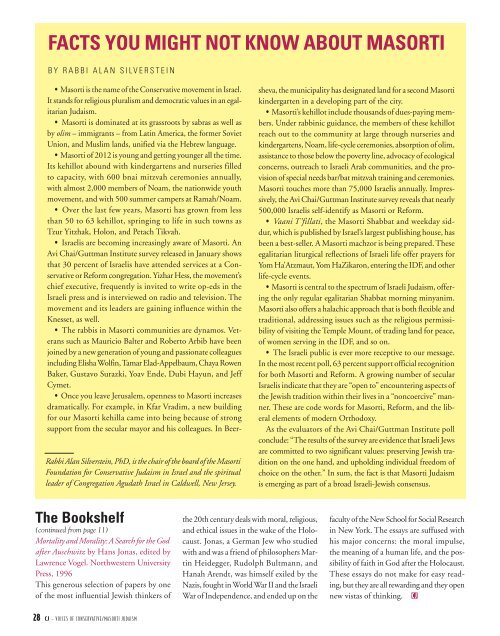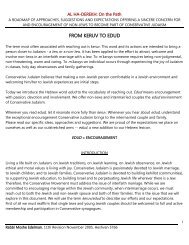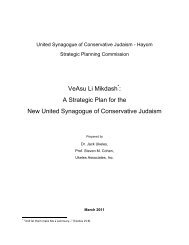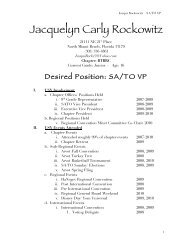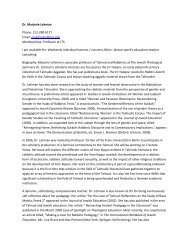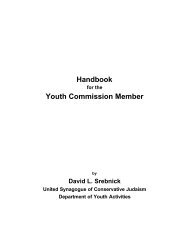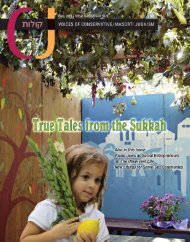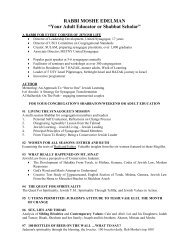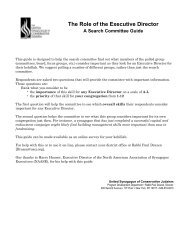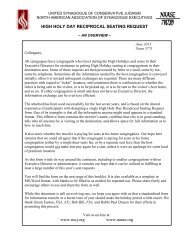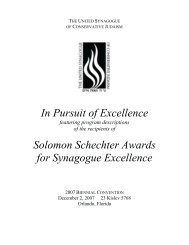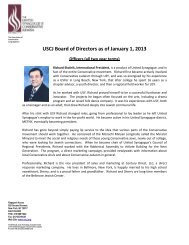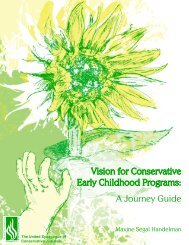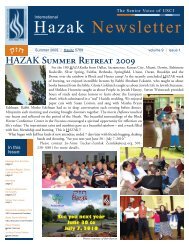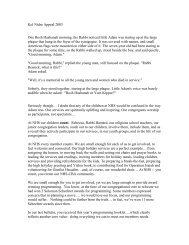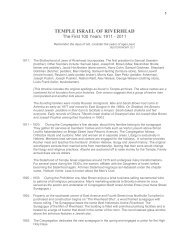What We Eat - United Synagogue of Conservative Judaism
What We Eat - United Synagogue of Conservative Judaism
What We Eat - United Synagogue of Conservative Judaism
You also want an ePaper? Increase the reach of your titles
YUMPU automatically turns print PDFs into web optimized ePapers that Google loves.
FACTS YOU MIGHT NOT KNOW ABOUT MASORTI<br />
BY RABBI ALAN SILVERSTEIN<br />
• Masorti is the name <strong>of</strong> the <strong>Conservative</strong> movement in Israel.<br />
It stands for religious pluralism and democratic values in an egalitarian<br />
<strong>Judaism</strong>.<br />
• Masorti is dominated at its grassroots by sabras as well as<br />
by olim – immigrants – from Latin America, the former Soviet<br />
Union, and Muslim lands, unified via the Hebrew language.<br />
• Masorti <strong>of</strong> 2012 is young and getting younger all the time.<br />
Its kehillot abound with kindergartens and nurseries filled<br />
to capacity, with 600 bnai mitzvah ceremonies annually,<br />
with almost 2,000 members <strong>of</strong> Noam, the nationwide youth<br />
movement, and with 500 summer campers at Ramah/Noam.<br />
• Over the last few years, Masorti has grown from less<br />
than 50 to 63 kehillot, springing to life in such towns as<br />
Tzur Yitzhak, Holon, and Petach Tikvah.<br />
• Israelis are becoming increasingly aware <strong>of</strong> Masorti. An<br />
Avi Chai/Guttman Institute survey released in January shows<br />
that 30 percent <strong>of</strong> Israelis have attended services at a <strong>Conservative</strong><br />
or Reform congregation. Yizhar Hess, the movement’s<br />
chief executive, frequently is invited to write op-eds in the<br />
Israeli press and is interviewed on radio and television. The<br />
movement and its leaders are gaining influence within the<br />
Knesset, as well.<br />
• The rabbis in Masorti communities are dynamos. Veterans<br />
such as Mauricio Balter and Roberto Arbib have been<br />
joined by a new generation <strong>of</strong> young and passionate colleagues<br />
including Elisha Wolfin, Tamar Elad-Appelbaum, Chaya Rowen<br />
Baker, Gustavo Surazki, Yoav Ende, Dubi Hayun, and Jeff<br />
Cymet.<br />
• Once you leave Jerusalem, openness to Masorti increases<br />
dramatically. For example, in Kfar Vradim, a new building<br />
for our Masorti kehilla came into being because <strong>of</strong> strong<br />
support from the secular mayor and his colleagues. In Beer-<br />
Rabbi Alan Silverstein, PhD, is the chair <strong>of</strong> the board <strong>of</strong> the Masorti<br />
Foundation for <strong>Conservative</strong> <strong>Judaism</strong> in Israel and the spiritual<br />
leader <strong>of</strong> Congregation Agudath Israel in Caldwell, New Jersey.<br />
The Bookshelf<br />
(continued from page 11)<br />
Mortality and Morality: A Search for the God<br />
after Auschwitz by Hans Jonas, edited by<br />
Lawrence Vogel. Northwestern University<br />
Press, 1996<br />
This generous selection <strong>of</strong> papers by one<br />
<strong>of</strong> the most influential Jewish thinkers <strong>of</strong><br />
28 CJ — VOICES OF CONSERVATIVE/MASORTI JUDAISM<br />
the 20th century deals with moral, religious,<br />
and ethical issues in the wake <strong>of</strong> the Holocaust.<br />
Jonas, a German Jew who studied<br />
with and was a friend <strong>of</strong> philosophers Martin<br />
Heidegger, Rudolph Bultmann, and<br />
Hanah Arendt, was himself exiled by the<br />
Nazis, fought in World War II and the Israeli<br />
War <strong>of</strong> Independence, and ended up on the<br />
sheva, the municipality has designated land for a second Masorti<br />
kindergarten in a developing part <strong>of</strong> the city.<br />
• Masorti’s kehillot include thousands <strong>of</strong> dues-paying members.<br />
Under rabbinic guidance, the members <strong>of</strong> these kehillot<br />
reach out to the community at large through nurseries and<br />
kindergartens, Noam, life-cycle ceremonies, absorption <strong>of</strong> olim,<br />
assistance to those below the poverty line, advocacy <strong>of</strong> ecological<br />
concerns, outreach to Israeli Arab communities, and the provision<br />
<strong>of</strong> special needs bar/bat mitzvah training and ceremonies.<br />
Masorti touches more than 75,000 Israelis annually. Impressively,<br />
the Avi Chai/Guttman Institute survey reveals that nearly<br />
500,000 Israelis self-identify as Masorti or Reform.<br />
• Vaani T’fillati, the Masorti Shabbat and weekday siddur,<br />
which is published by Israel’s largest publishing house, has<br />
been a best-seller. A Masorti machzor is being prepared. These<br />
egalitarian liturgical reflections <strong>of</strong> Israeli life <strong>of</strong>fer prayers for<br />
Yom Ha’Atzmaut, Yom HaZikaron, entering the IDF, and other<br />
life-cycle events.<br />
• Masorti is central to the spectrum <strong>of</strong> Israeli <strong>Judaism</strong>, <strong>of</strong>fering<br />
the only regular egalitarian Shabbat morning minyanim.<br />
Masorti also <strong>of</strong>fers a halachic approach that is both flexible and<br />
traditional, addressing issues such as the religious permissibility<br />
<strong>of</strong> visiting the Temple Mount, <strong>of</strong> trading land for peace,<br />
<strong>of</strong> women serving in the IDF, and so on.<br />
• The Israeli public is ever more receptive to our message.<br />
In the most recent poll, 63 percent support <strong>of</strong>ficial recognition<br />
for both Masorti and Reform. A growing number <strong>of</strong> secular<br />
Israelis indicate that they are “open to” encountering aspects <strong>of</strong><br />
the Jewish tradition within their lives in a “noncoercive” manner.<br />
These are code words for Masorti, Reform, and the liberal<br />
elements <strong>of</strong> modern Orthodoxy.<br />
As the evaluators <strong>of</strong> the Avi Chai/Guttman Institute poll<br />
conclude: “The results <strong>of</strong> the survey are evidence that Israeli Jews<br />
are committed to two significant values: preserving Jewish tradition<br />
on the one hand, and upholding individual freedom <strong>of</strong><br />
choice on the other.” In sum, the fact is that Masorti <strong>Judaism</strong><br />
is emerging as part <strong>of</strong> a broad Israeli-Jewish consensus.<br />
faculty <strong>of</strong> the New School for Social Research<br />
in New York. The essays are suffused with<br />
his major concerns: the moral impulse,<br />
the meaning <strong>of</strong> a human life, and the possibility<br />
<strong>of</strong> faith in God after the Holocaust.<br />
These essays do not make for easy reading,<br />
but they are all rewarding and they open<br />
new vistas <strong>of</strong> thinking. CJ


